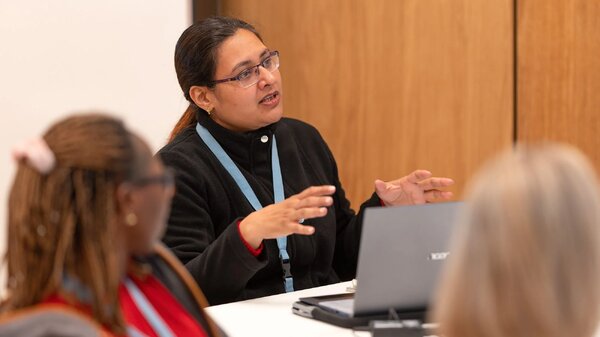Am letzten Mittwoch, dem 29. Januar 2025, hat der Bundesrat darüber entschieden, wie die Kürzungsbeschlüsse des Parlaments in der internationalen Zusammenarbeit umgesetztwerden sollen. Für die neue Strategie zur internationalen Zusammenarbeit 2025-2028 wurde der Verpflichtungskredit um 151 Millionen Franken auf 11.12 Mrd. Franken gekürzt. Das bedeutet aber nicht, dass nun dieser Betrag für die gesamte Strategieperiode gesichert sei. Das Parlament kann für jedes Budgetjahr neu entscheiden, das heisst weiter kürzen oder aber auch Budgets erhöhen. Für 2025 wurde der Betrag um 110 Millionen gekürzt.
Für Schweizer Nichtregierungsorganisationen wurde entschieden, die Kernbeiträge um 7.5 Millionen Franken zu reduzieren. Damit wird der Druck auf Schweizer NGOs nach verschiedenen umstrittenen Entscheiden seit dem beinahe Erfolg der ersten Konzernverantwortungsinitiative weiter erhöht. Die Kürzungen betreffen die sogenannten Kernbeiträge an Organisationen – ein System, das von der OECD-DAC als sehr sinnvoll und effektiv gelobt wird, gerade auch vor dem Hintergrund der laufenden Lokalisierungsdebatte.
Mischung aus Querschnittskürzungen und strategischen Fokussierungen
Der Bundesrat wählt in der Umsetzung der Parlamentsbeschlüsse einen Weg zwischen Querschnittskürzungen und fokussierten strategischen Kürzungen. Das ist nachvollziehbar, führt aber auch zu gewissen erklärungsbedürftigen Entscheiden. Natürlich lässt sich etwa der Rückzug der Entwicklungszusammenarbeit aus Bangladesch mit der dortigen wirtschaftlich positiven Entwicklung erklären, ist aber gleichzeitig vor dem Hintergrund der dort zurzeit laufenden Demokratisierungsbemühungen fragwürdig.
Den Weg der strategischen Konzentration geht der Bundesrat auch in der globalen Gesundheit. Gesundheit ist in der neuen Strategie – auch dank dem hohen Engagement des Netzwerks Medicus Mundi Schweiz– ein neues, prioritäres Thema. Der Bundesrat hat nun den Rückzug aus UNAIDS entschieden (jährliche Einsparung: 3.1 Millionen Franken). Demgegenüber bleibt die finanzielle Unterstützung für den Globalen Fonds zur Bekämpfung von HIV/Aids, Tuberkulose und Malaria unangetastet.
Rückzug der Schweiz aus UNAIDS
Angesichts des Spardruckes des Parlamentes kann dieser Entscheid nachvollzogen, doch soll hier auch auf die Konsequenzen hingewiesen werden. UNAIDS spielt eine zentrale Funktion im Kampf gegen Aids. Sie erhebt die Daten auf nationaler Ebene, sichert die wissenschaftlichen Erkenntnisse über die Entwicklung der Epidemie und definiert die strategischen Ziele. UNAIDS spielt damit eine wichtige normgebende und strategische Rolle. Sie ist nicht in Konkurrenz zum Globalen Fonds zu verstehen, denn dieser ist in seiner Arbeit zentral auf ihre Arbeit angewiesen.
UNAIDS steht bereits unter Druck; das Mandat der UN-Organisation ist vorerst bis 2030 beschränkt. Die Staatengemeinschaft ist in den vergangenen Jahren ihren finanziellen Verpflichtungen UNAIDS gegenüber nicht nachgekommen, was zu einem Stellenabbau und zu Stellenverschiebungen, weg aus der teuren Genfer Zentrale in andere Länder geführt hat. Die Schweizer Politik sollte sich schon dessen bewusst sein, dass die Kürzungen in der multilateralen Zusammenarbeit das internationale Genf schwächen.
Das internationale Genf unter Druck
Zu hoffen bleibt auch, dass sich der Bundesrat beim Rückzug gut überlegt hat, ob neben dem Genfer Aspekt weitere strategische Implikationen tragbar sind. Das Schweizer Engagement in der globalen Gesundheit zeichnet sich nicht durch hohen finanziellen Mitteleinsatz aus, sondern dadurch, sich strategisch kohärent in verschiedenen Institutionen für zentrale Themen wie Geschlechtergerechtigkeit, sexuelle und reproduktive Rechte, menschenrechtsbasierte Ansätze und einen auf lokale Gemeinschaften ausgerichtete Politik zu engagieren.
Ein Klacks angesichts des drohenden Orkans
Alles Elemente, die international massiv unter Druck stehen. Dieser Druck auf grundlegende Rechte, ohne welche die öffentliche Gesundheit nicht gesichert werden kann, wird sich mit dem Amtsantritt der neuen US-amerikanischen Regierung und mit dem möglichem Rechtsrutsch in verschiedenen europäischen Regierungen noch weiter verschärfen.
Die finanziellen Aspekte sind also nur ein Teil der Geschichte – die Schweizer Kürzungen sind ein Klacks verglichen mit dem, was ein Rückzug der USA aus verschiedenen globalen Gesundheitsinstitutionen bedeuten würde. Da stehen die Zeichen nicht auf Sturm, sondern auf Orkan, Flut und Erdbeben gleichzeitig. Das bedeutet auch, dass ein strategisch kluges Engagement der Schweiz in der internationalen Zusammenarbeit wichtiger denn je ist.
Zur Transparenz: Medicus Mundi Schweiz erhält von der Direktion für Entwicklung und Zusammenarbeit (DEZA) einen Kernbeitrag (Programmbeitrag) über 350'000 Franken/Jahr.
Martin Leschhorn Strebel
Netzwerk Medicus Mundi Schweiz
E-Mail


















































